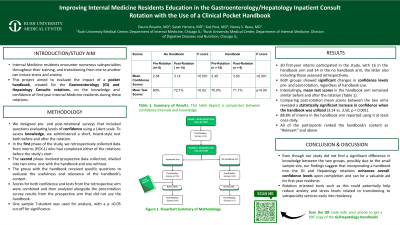Tuesday Poster Session
Category: Practice Management
P4910 - Improving Internal Medicine Residents Education in the Gastroenterology/Hepatology Inpatient Consult Rotation with the Use of a Clinical Pocket Handbook
Tuesday, October 29, 2024
10:30 AM - 4:00 PM ET
Location: Exhibit Hall E

Has Audio

Dauris Rosario, MD
Rush University Medical Center
Chicago, IL
Presenting Author(s)
Dauris Rosario, MD, Zoë Post, MD, Sarah Herrera Mercedes, MD, Nancy Reau, MD
Rush University Medical Center, Chicago, IL
Introduction: Internal Medicine residents encounter numerous subspecialties throughout their training, and transitioning from one rotation to another can induce stress and anxiety. This project aimed to evaluate the impact of a pocket handbook, created for the Gastroenterology (GI) and Hepatology Consults rotations, on the knowledge and confidence of first-year Internal Medicine residents during these rotations.
Methods: We designed pre- and post-rotational surveys that included questions evaluating levels of confidence using a Likert scale. To assess knowledge, we administered a short, board-style quiz both before and after the rotation. In the first phase of the study, we retrospectively collected data from interns who had completed either of the rotations before the study's start. The second phase involved prospective data collection, divided into two arms: one with the handbook and one without. To prevent interaction, this division was based on the interns' schedules. The group with the handbook received specific questions to evaluate the usefulness and relevance of the handbook’s content. The handbook was provided after the pre-rotation survey was completed. Scores for both confidence and quiz from the retrospective arm were combined and then analyzed alongside the post-rotation survey results from the prospective arm that did not use the handbook. One sample T-student was used for analysis, with a p < 0.05 cut-off for significance.
Results: A total of 30 first-year interns participated in the study, with 16 in the handbook arm and 14 in the no handbook arm, the latter group also including those assessed retrospectively. Both groups showed significant changes in confidence levels pre- and post-rotation, regardless of handbook use. Interestingly, mean test scores in the handbook arm remained similar before and after the rotation (Table 1). Comparing post-rotation mean scores between the two arms revealed a statistically significant increase in confidence when the handbook was utilized (3.14 vs. 3.50, p < 0.001). 88.8% of interns in the handbook arm reported using it at least once daily. All of the participants ranked the handbook’s content as “Relevant” and above.
Discussion: Even though our study did not find a significant difference in knowledge between the two groups, possibly due to the small sample size, our findings suggest that incorporating a handbook into the GI and Hepatology rotations enhances overall confidence levels upon completion and can be a valuable aid for first-year residents.
Note: The table for this abstract can be viewed in the ePoster Gallery section of the ACG 2024 ePoster Site or in The American Journal of Gastroenterology's abstract supplement issue, both of which will be available starting October 27, 2024.
Disclosures:
Dauris Rosario, MD, Zoë Post, MD, Sarah Herrera Mercedes, MD, Nancy Reau, MD. P4910 - Improving Internal Medicine Residents Education in the Gastroenterology/Hepatology Inpatient Consult Rotation with the Use of a Clinical Pocket Handbook, ACG 2024 Annual Scientific Meeting Abstracts. Philadelphia, PA: American College of Gastroenterology.
Rush University Medical Center, Chicago, IL
Introduction: Internal Medicine residents encounter numerous subspecialties throughout their training, and transitioning from one rotation to another can induce stress and anxiety. This project aimed to evaluate the impact of a pocket handbook, created for the Gastroenterology (GI) and Hepatology Consults rotations, on the knowledge and confidence of first-year Internal Medicine residents during these rotations.
Methods: We designed pre- and post-rotational surveys that included questions evaluating levels of confidence using a Likert scale. To assess knowledge, we administered a short, board-style quiz both before and after the rotation. In the first phase of the study, we retrospectively collected data from interns who had completed either of the rotations before the study's start. The second phase involved prospective data collection, divided into two arms: one with the handbook and one without. To prevent interaction, this division was based on the interns' schedules. The group with the handbook received specific questions to evaluate the usefulness and relevance of the handbook’s content. The handbook was provided after the pre-rotation survey was completed. Scores for both confidence and quiz from the retrospective arm were combined and then analyzed alongside the post-rotation survey results from the prospective arm that did not use the handbook. One sample T-student was used for analysis, with a p < 0.05 cut-off for significance.
Results: A total of 30 first-year interns participated in the study, with 16 in the handbook arm and 14 in the no handbook arm, the latter group also including those assessed retrospectively. Both groups showed significant changes in confidence levels pre- and post-rotation, regardless of handbook use. Interestingly, mean test scores in the handbook arm remained similar before and after the rotation (Table 1). Comparing post-rotation mean scores between the two arms revealed a statistically significant increase in confidence when the handbook was utilized (3.14 vs. 3.50, p < 0.001). 88.8% of interns in the handbook arm reported using it at least once daily. All of the participants ranked the handbook’s content as “Relevant” and above.
Discussion: Even though our study did not find a significant difference in knowledge between the two groups, possibly due to the small sample size, our findings suggest that incorporating a handbook into the GI and Hepatology rotations enhances overall confidence levels upon completion and can be a valuable aid for first-year residents.
Note: The table for this abstract can be viewed in the ePoster Gallery section of the ACG 2024 ePoster Site or in The American Journal of Gastroenterology's abstract supplement issue, both of which will be available starting October 27, 2024.
Disclosures:
Dauris Rosario indicated no relevant financial relationships.
Zoë Post indicated no relevant financial relationships.
Sarah Herrera Mercedes indicated no relevant financial relationships.
Nancy Reau: AbbVie – Grant/Research Support. Arbutus – Advisor or Review Panel Member. Gilead – Advisor or Review Panel Member, Consultant, Grant/Research Support. Salix – Advisor or Review Panel Member, Grant/Research Support. VIR – Advisor or Review Panel Member.
Dauris Rosario, MD, Zoë Post, MD, Sarah Herrera Mercedes, MD, Nancy Reau, MD. P4910 - Improving Internal Medicine Residents Education in the Gastroenterology/Hepatology Inpatient Consult Rotation with the Use of a Clinical Pocket Handbook, ACG 2024 Annual Scientific Meeting Abstracts. Philadelphia, PA: American College of Gastroenterology.
